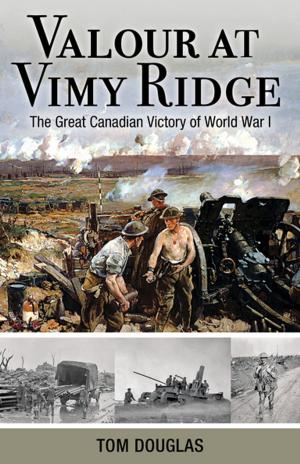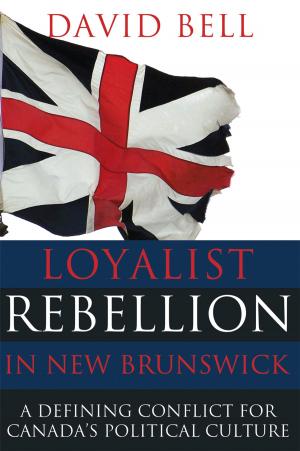Canada's Bastions of Empire
Halifax, Victoria and the Royal Navy 1749-1918
Nonfiction, History, Canada, Military, Naval| Author: | Bryan Elson | ISBN: | 9781459503274 |
| Publisher: | Formac Publishing Company Limited | Publication: | October 16, 2014 |
| Imprint: | Formac | Language: | English |
| Author: | Bryan Elson |
| ISBN: | 9781459503274 |
| Publisher: | Formac Publishing Company Limited |
| Publication: | October 16, 2014 |
| Imprint: | Formac |
| Language: | English |
This book offers a fresh perspective on North American history, and the key role played by Halifax and Victoria in ensuring that Canada emerged as an independent country in the 20th century.
Brian Elson focuses on the significance of the bases for the all-powerful British navy at Halifax and Victoria through the 19th century and the First World War. As he explains, Halifax gave the Royal Navy the land base they needed to project British power along the whole east Atlantic coast of North America. Victoria�s Esquimault did the same thing for the Pacific coast.
During the 1800s the United States grew dramatically, adding huge swaths of lands west, south and north that had belonged to France, Spain, Mexico, and Russia � while pushing aside native peoples. More than once the American government came into conflict with Britain over British territory in North America. There were threats of war and annexation, and American popular support for absorbing Canada was strong.
In this book Bryan Elson shows how the British presence in Halifax, and later in Victoria, stood in the way of US designs on Canada. American leaders knew that the British Navy, with its bases on both coasts, had the power to cut them off from the rest of the world with a naval blockade. The American threat to Canada was effectively countered by the British presence in these two cities.
The two bastions played their most important role in the early years of the First World War. As Bryan Elson explains, in 1914 the United States stood aside while the British Empire, including Canada, took on Germany. In this situation, the British navy � including the Canadian navy�s first east coast warship � mounted a show of force by stopping all incoming and outgoing traffic from the port of New York. This lasted until the US finally opted into the war, on the side of Britain, in 1917.
Meanwhile, on the west coast the Equimault naval base was buttressed by the extraordinary action of the B.C. provincial government � which at the start of the war bought two new submarines from a shipyard in Seattle for the fledgling Canadian navy.
Brian Elson focuses on the significance of the bases for the all-powerful British navy at Halifax and Victoria through the 19th century and the First World War. As he explains, Halifax gave the Royal Navy the land base they needed to project British power along the whole east Atlantic coast of North America. Victoria�s Esquimault did the same thing for the Pacific coast.
During the 1800s the United States grew dramatically, adding huge swaths of lands west, south and north that had belonged to France, Spain, Mexico, and Russia � while pushing aside native peoples. More than once the American government came into conflict with Britain over British territory in North America. There were threats of war and annexation, and American popular support for absorbing Canada was strong.
In this book Bryan Elson shows how the British presence in Halifax, and later in Victoria, stood in the way of US designs on Canada. American leaders knew that the British Navy, with its bases on both coasts, had the power to cut them off from the rest of the world with a naval blockade. The American threat to Canada was effectively countered by the British presence in these two cities.
The two bastions played their most important role in the early years of the First World War. As Bryan Elson explains, in 1914 the United States stood aside while the British Empire, including Canada, took on Germany. In this situation, the British navy � including the Canadian navy�s first east coast warship � mounted a show of force by stopping all incoming and outgoing traffic from the port of New York. This lasted until the US finally opted into the war, on the side of Britain, in 1917.
Meanwhile, on the west coast the Equimault naval base was buttressed by the extraordinary action of the B.C. provincial government � which at the start of the war bought two new submarines from a shipyard in Seattle for the fledgling Canadian navy.
This book offers a fresh perspective on North American history, and the key role played by Halifax and Victoria in ensuring that Canada emerged as an independent country in the 20th century.
Brian Elson focuses on the significance of the bases for the all-powerful British navy at Halifax and Victoria through the 19th century and the First World War. As he explains, Halifax gave the Royal Navy the land base they needed to project British power along the whole east Atlantic coast of North America. Victoria�s Esquimault did the same thing for the Pacific coast.
During the 1800s the United States grew dramatically, adding huge swaths of lands west, south and north that had belonged to France, Spain, Mexico, and Russia � while pushing aside native peoples. More than once the American government came into conflict with Britain over British territory in North America. There were threats of war and annexation, and American popular support for absorbing Canada was strong.
In this book Bryan Elson shows how the British presence in Halifax, and later in Victoria, stood in the way of US designs on Canada. American leaders knew that the British Navy, with its bases on both coasts, had the power to cut them off from the rest of the world with a naval blockade. The American threat to Canada was effectively countered by the British presence in these two cities.
The two bastions played their most important role in the early years of the First World War. As Bryan Elson explains, in 1914 the United States stood aside while the British Empire, including Canada, took on Germany. In this situation, the British navy � including the Canadian navy�s first east coast warship � mounted a show of force by stopping all incoming and outgoing traffic from the port of New York. This lasted until the US finally opted into the war, on the side of Britain, in 1917.
Meanwhile, on the west coast the Equimault naval base was buttressed by the extraordinary action of the B.C. provincial government � which at the start of the war bought two new submarines from a shipyard in Seattle for the fledgling Canadian navy.
Brian Elson focuses on the significance of the bases for the all-powerful British navy at Halifax and Victoria through the 19th century and the First World War. As he explains, Halifax gave the Royal Navy the land base they needed to project British power along the whole east Atlantic coast of North America. Victoria�s Esquimault did the same thing for the Pacific coast.
During the 1800s the United States grew dramatically, adding huge swaths of lands west, south and north that had belonged to France, Spain, Mexico, and Russia � while pushing aside native peoples. More than once the American government came into conflict with Britain over British territory in North America. There were threats of war and annexation, and American popular support for absorbing Canada was strong.
In this book Bryan Elson shows how the British presence in Halifax, and later in Victoria, stood in the way of US designs on Canada. American leaders knew that the British Navy, with its bases on both coasts, had the power to cut them off from the rest of the world with a naval blockade. The American threat to Canada was effectively countered by the British presence in these two cities.
The two bastions played their most important role in the early years of the First World War. As Bryan Elson explains, in 1914 the United States stood aside while the British Empire, including Canada, took on Germany. In this situation, the British navy � including the Canadian navy�s first east coast warship � mounted a show of force by stopping all incoming and outgoing traffic from the port of New York. This lasted until the US finally opted into the war, on the side of Britain, in 1917.
Meanwhile, on the west coast the Equimault naval base was buttressed by the extraordinary action of the B.C. provincial government � which at the start of the war bought two new submarines from a shipyard in Seattle for the fledgling Canadian navy.















